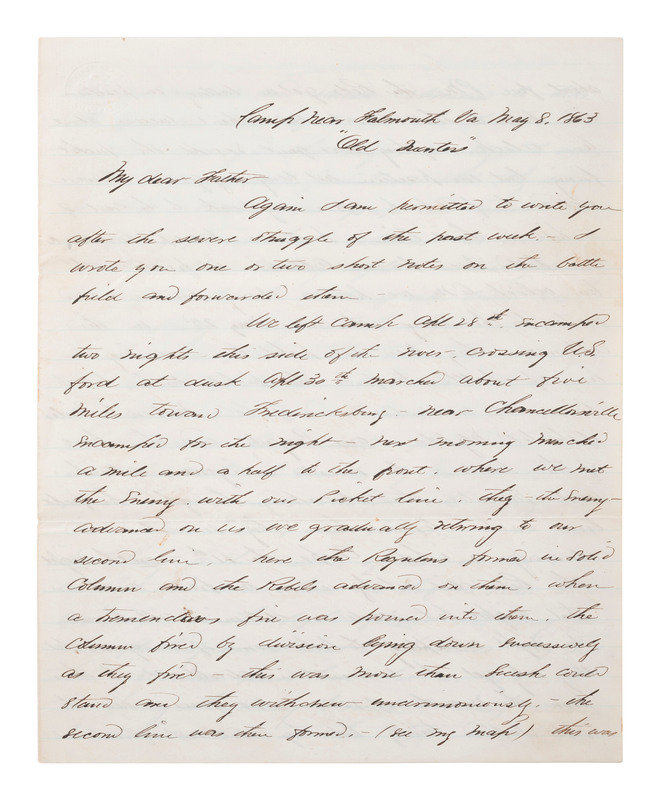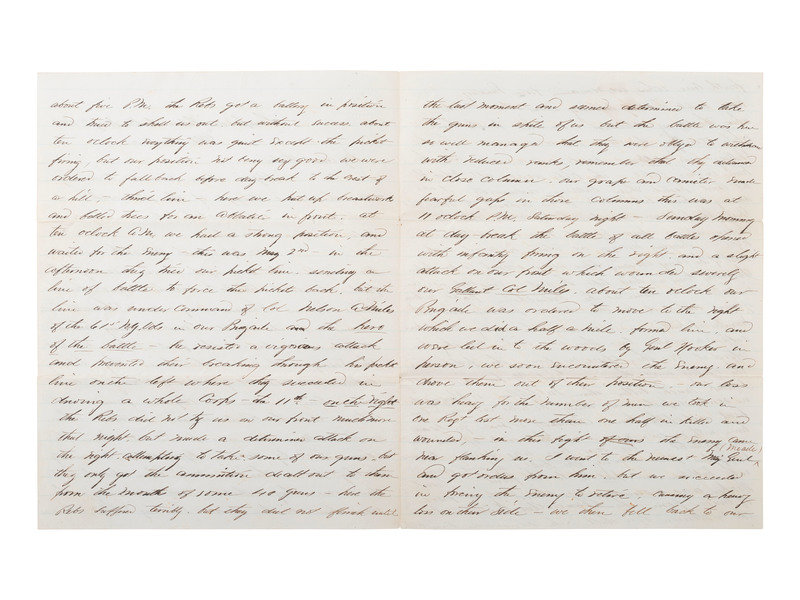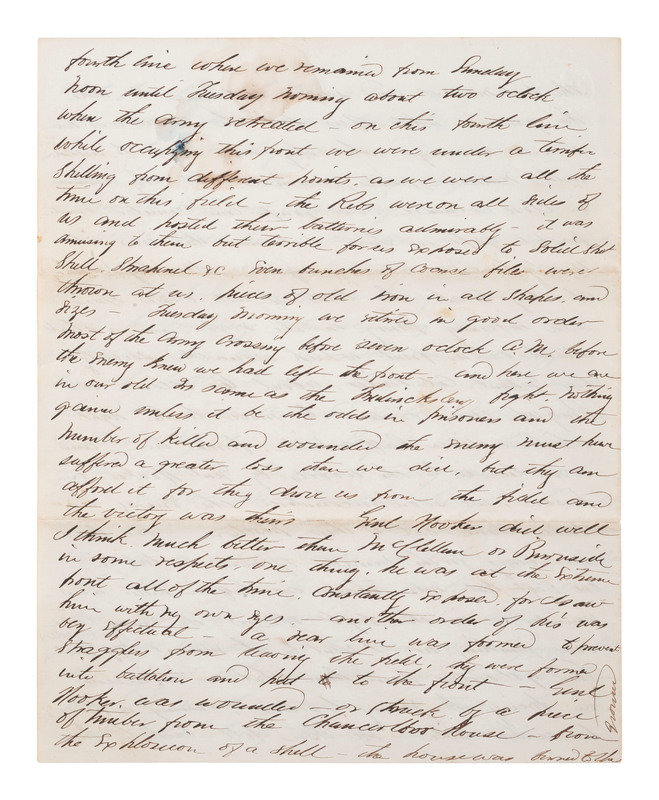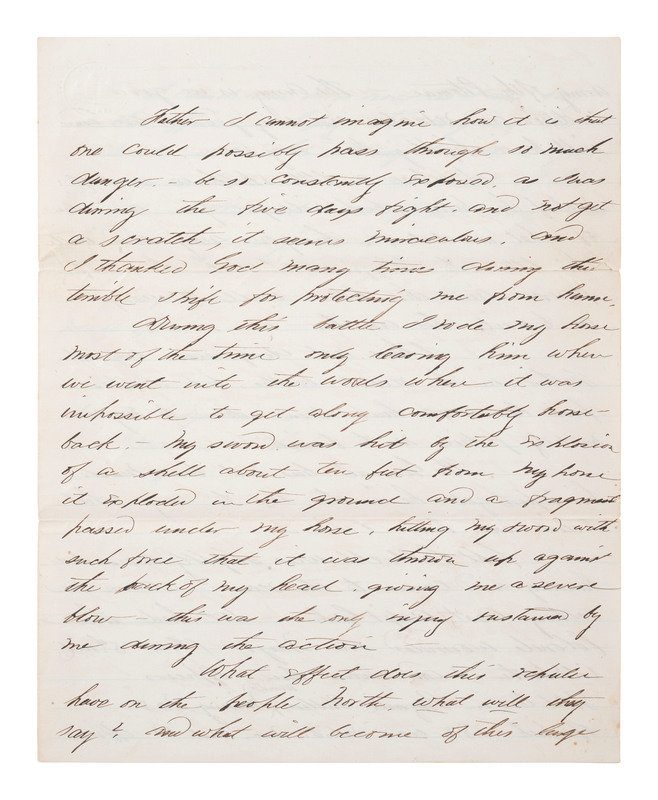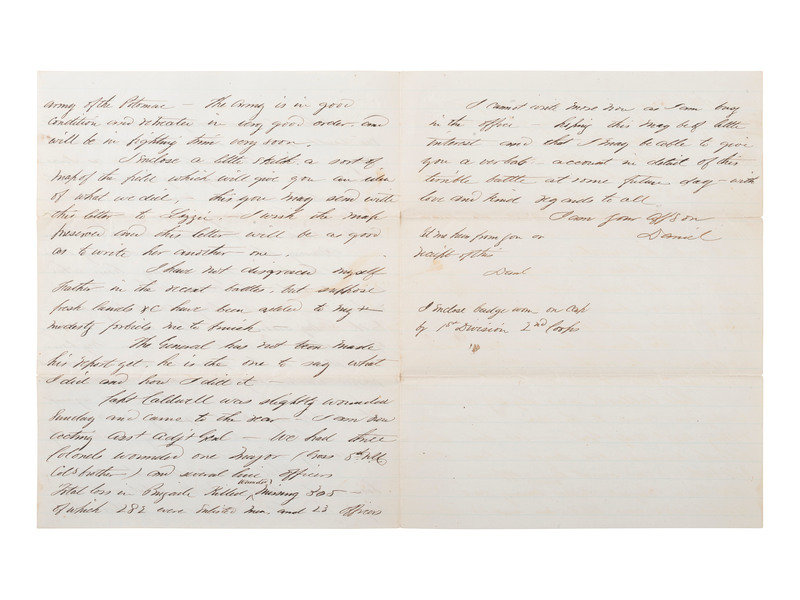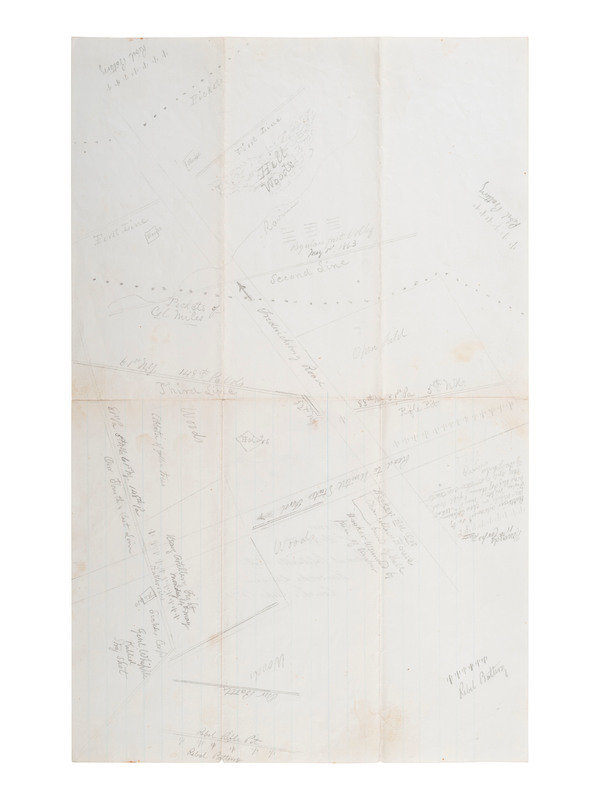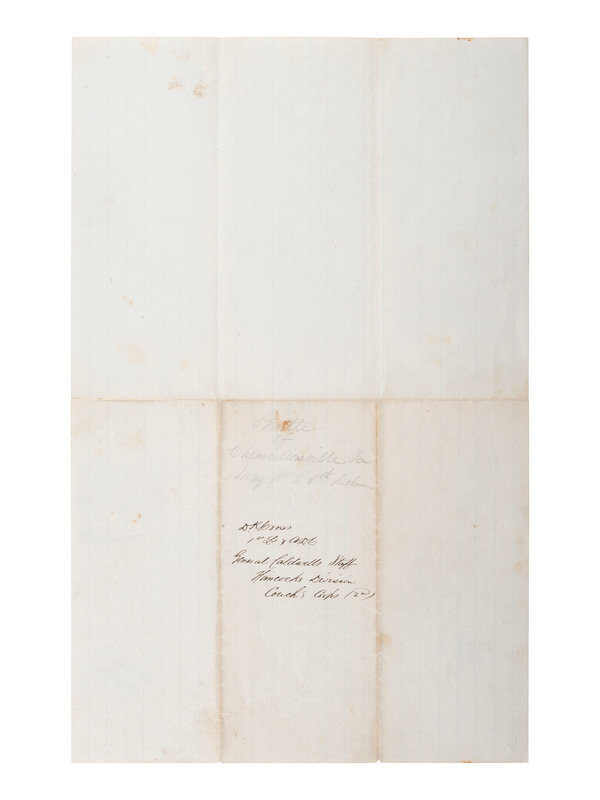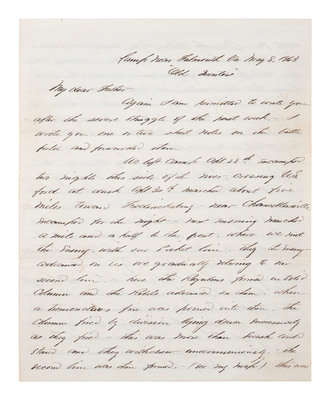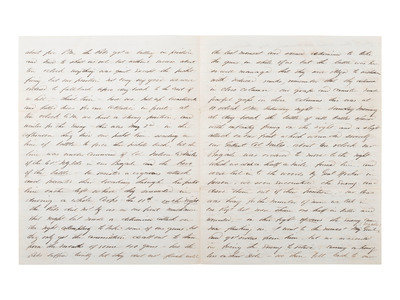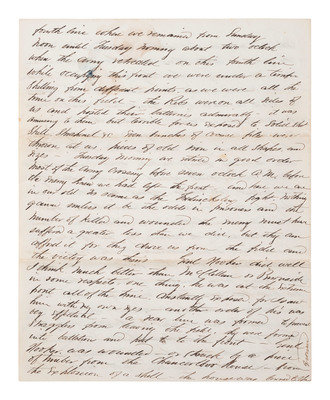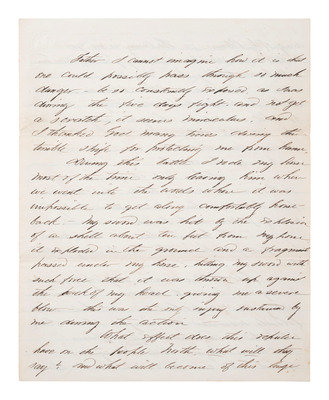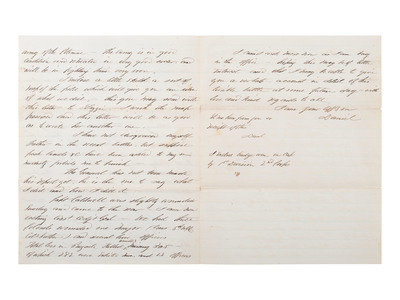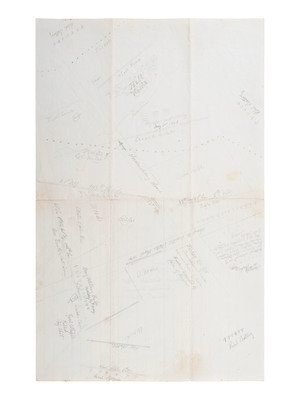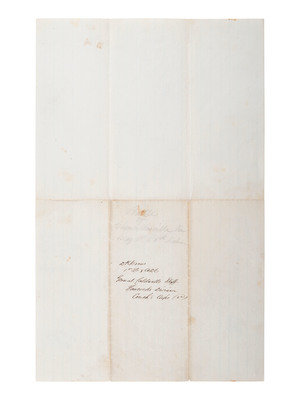Lot 144
[CIVIL WAR]. Battle of Chancellorsville letter with hand-drawn map of the battlefield, written 5 days after the battle by First Lieutenant Daniel K. Cross, 5th New Hampshire Infantry. "Camp near Falmouth Va," 8 May 1863.
Sale 1192 - American Historical Ephemera & Photography
Lots 1-294
Jun 15, 2023
10:00AM ET
Lots 295-567
Jun 16, 2023
10:00AM ET
Live / Cincinnati
Own a similar item?
Estimate
$1,500 -
2,500
Price Realized
$2,835
Sold prices are inclusive of Buyer’s Premium
Lot Description
[CIVIL WAR]. Battle of Chancellorsville letter with hand-drawn map of the battlefield, written 5 days after the battle by First Lieutenant Daniel K. Cross, 5th New Hampshire Infantry. "Camp near Falmouth Va," 8 May 1863.
6 1/2 pages, 7 5/8 x 9 5/8 in., creased at folds, with partial separations to creases and light toning/soiling throughout.
In this letter to his father, dated just 5 days after the Battle of Chancellorsville, Cross describes the battle, noting near the end his own astonishment that he has emerged unscathed.
His narrative begins with leaving camp on 28 April, camping for two nights and marching toward Fredericksburg, near Chancellorsville. They met the enemy on 1 May: "Here the Regulars formed in solid column, and the Rebels advanced on them, when a tremendous fire was poured into them. The column fired by division, lying down successively as they fired - this was more than the secesh could stand and they withdrew unceremoniously."
Describing the morning of 3 May, Cross writes, "Sunday morning at daybreak the battle of all battles opened with infantry firing on the right and a slight attack on our front which wounded severely our gallant Colonel Miles. About ten oclock our Brigade was ordered to move to the right which we did a half a mile. formed line, and were led in to the woods by Genl Hooker in person, we soon encountered the enemy, and drove them out of their position. Our loss was heavy for the number of men we took in. One Regt lost more than one half in killed and wounded, in this fight of ours the enemy came near flanking us. I went to the nearest Maj. Genl (Meade) and got orders from him, but we succeeded in forcing the enemy to retire, causing a heavy loss on their side..."
After falling back to what Cross calls the "fourth line," where they remained from Sunday until Tuesday morning, they came under a "terrific shelling from different points." He writes, "...the Rebs were on all sides of us and posted their batteries admirably - it was amusing to them but terrible for us exposed to solid shot shell, shrapnel &c. Even bunches of coarse files were thrown at us, pieces of old iron in all shapes, and sizes..."
Cross concludes his description of the battle with praise for General Hooker, writing, "General Hooker did well I think, much better than McClellan or Burnside in some respects, one thing, he was at the extreme front all of the time. Constantly exposed, for I saw him with my own eyes. Antoerh order of his was very effectual. A rear line was formed to prevent stragglers from leaving the field, they were formed into battalions and put to the front. Genl Hooker was wounded or struck by a piece of timber from the Chancellor House, from the explosion of a shell, the house was burned to the ground."
The accompanying map is referenced again, near the end of his letter: "I enclose a little sketch, a sort of map of the field, which will give you an idea of what we did..."
Cross is astonished that his only injury from the battle was a blow to the head from a shell explosion hitting his sword and throwing it against the back of his head. He assures his father that he has not disgraced himself, but rather supposes he will be acknowledged for his performance in the battle. With Captain Caldwell slightly wounded, 3 colonels wounded, and one major wounded, Cross has already been made acting assistant adjutant general.
In a postscript, Cross notes that he encloses a badge worn on the caps of the 1st Division, II Corps, though that badge is not present here.
Letter accompanied by 5 3/8 x 9 5/8 in. pencil-drawn map showing, in incredible detail, Union positions, Confederate positions, and sites of important events at Chancellorsville including an area labelled "Heavy Artillery Fight, Monday 14th May," a rectangle labelled "Hookers Hd Qrs, Chancellors House, burned by shell, Hooker wounded by piece of timber," and more. Docketed verso with Cross's full military identification: "D.K. Cross, 1st Lt & A.D.C., General Caldwells Staff, Hancock's Division, Couch's Corps (2nd)."
Daniel K. Cross (d. 1896) enlisted as a sergeant major on 28 September 1861, mustering into the 5th New Hampshire Infantry regiment a month later. He was promoted twice, up to the rank of 1st lieutenant within that regiment, before being discharged for promotion in November of 1863. He was at that point commissioned a captain and aide-de-camp of the US Volunteers. He resigned from that post in April of 1864 and it appears he returned to his regiment. He was promoted to major and lieutenant colonel by brevet in March of 1865.
In this letter to his father, dated just 5 days after the Battle of Chancellorsville, Cross describes the battle, noting near the end his own astonishment that he has emerged unscathed.
His narrative begins with leaving camp on 28 April, camping for two nights and marching toward Fredericksburg, near Chancellorsville. They met the enemy on 1 May: "Here the Regulars formed in solid column, and the Rebels advanced on them, when a tremendous fire was poured into them. The column fired by division, lying down successively as they fired - this was more than the secesh could stand and they withdrew unceremoniously."
Describing the morning of 3 May, Cross writes, "Sunday morning at daybreak the battle of all battles opened with infantry firing on the right and a slight attack on our front which wounded severely our gallant Colonel Miles. About ten oclock our Brigade was ordered to move to the right which we did a half a mile. formed line, and were led in to the woods by Genl Hooker in person, we soon encountered the enemy, and drove them out of their position. Our loss was heavy for the number of men we took in. One Regt lost more than one half in killed and wounded, in this fight of ours the enemy came near flanking us. I went to the nearest Maj. Genl (Meade) and got orders from him, but we succeeded in forcing the enemy to retire, causing a heavy loss on their side..."
After falling back to what Cross calls the "fourth line," where they remained from Sunday until Tuesday morning, they came under a "terrific shelling from different points." He writes, "...the Rebs were on all sides of us and posted their batteries admirably - it was amusing to them but terrible for us exposed to solid shot shell, shrapnel &c. Even bunches of coarse files were thrown at us, pieces of old iron in all shapes, and sizes..."
Cross concludes his description of the battle with praise for General Hooker, writing, "General Hooker did well I think, much better than McClellan or Burnside in some respects, one thing, he was at the extreme front all of the time. Constantly exposed, for I saw him with my own eyes. Antoerh order of his was very effectual. A rear line was formed to prevent stragglers from leaving the field, they were formed into battalions and put to the front. Genl Hooker was wounded or struck by a piece of timber from the Chancellor House, from the explosion of a shell, the house was burned to the ground."
The accompanying map is referenced again, near the end of his letter: "I enclose a little sketch, a sort of map of the field, which will give you an idea of what we did..."
Cross is astonished that his only injury from the battle was a blow to the head from a shell explosion hitting his sword and throwing it against the back of his head. He assures his father that he has not disgraced himself, but rather supposes he will be acknowledged for his performance in the battle. With Captain Caldwell slightly wounded, 3 colonels wounded, and one major wounded, Cross has already been made acting assistant adjutant general.
In a postscript, Cross notes that he encloses a badge worn on the caps of the 1st Division, II Corps, though that badge is not present here.
Letter accompanied by 5 3/8 x 9 5/8 in. pencil-drawn map showing, in incredible detail, Union positions, Confederate positions, and sites of important events at Chancellorsville including an area labelled "Heavy Artillery Fight, Monday 14th May," a rectangle labelled "Hookers Hd Qrs, Chancellors House, burned by shell, Hooker wounded by piece of timber," and more. Docketed verso with Cross's full military identification: "D.K. Cross, 1st Lt & A.D.C., General Caldwells Staff, Hancock's Division, Couch's Corps (2nd)."
Daniel K. Cross (d. 1896) enlisted as a sergeant major on 28 September 1861, mustering into the 5th New Hampshire Infantry regiment a month later. He was promoted twice, up to the rank of 1st lieutenant within that regiment, before being discharged for promotion in November of 1863. He was at that point commissioned a captain and aide-de-camp of the US Volunteers. He resigned from that post in April of 1864 and it appears he returned to his regiment. He was promoted to major and lieutenant colonel by brevet in March of 1865.
Condition Report
Contact Information
Auction Specialist
